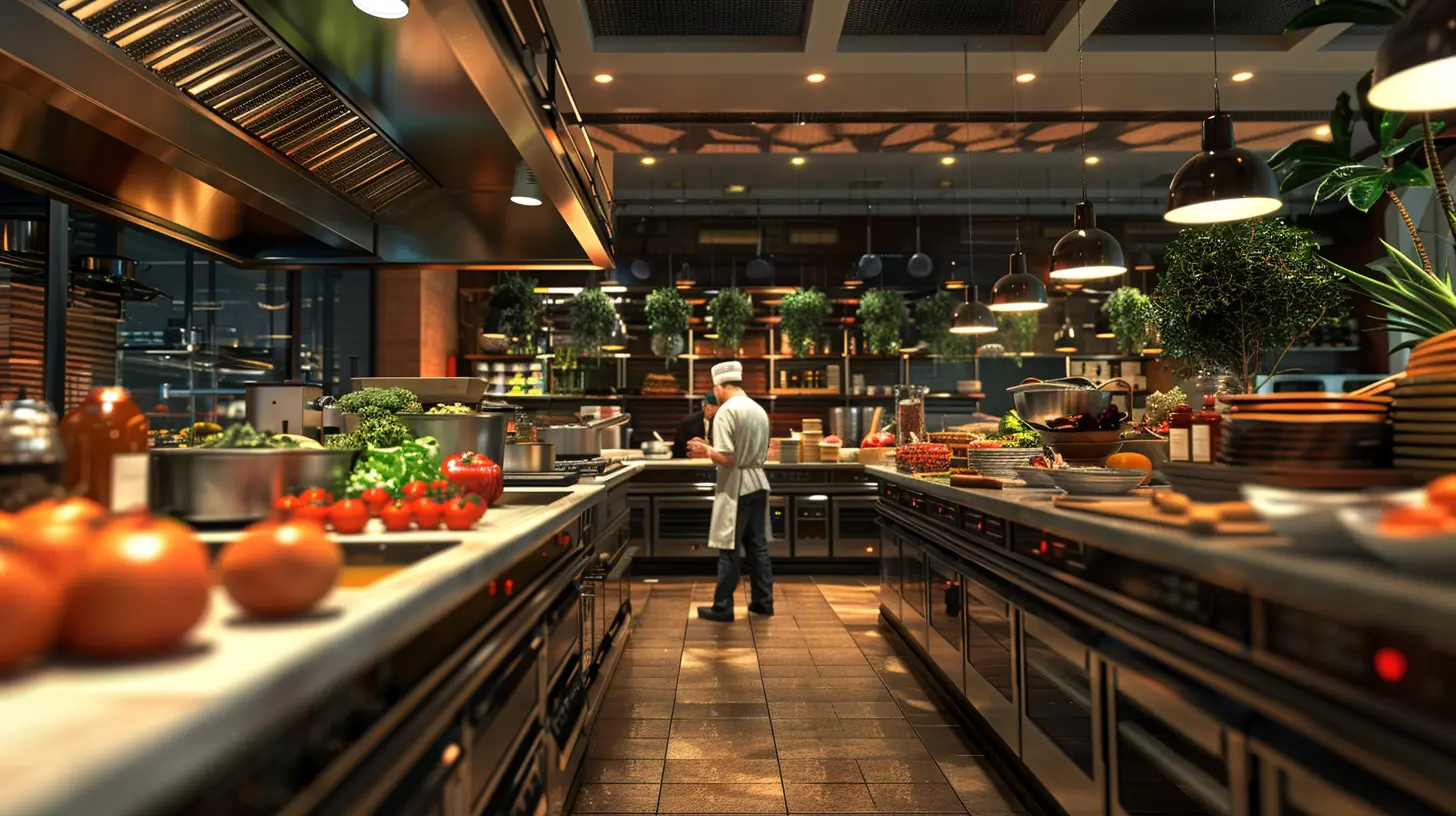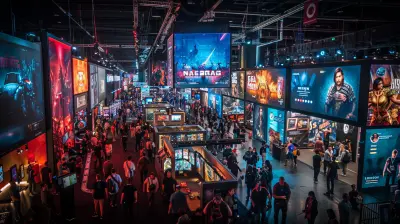Running a Virtual Restaurant: How Cooking Simulators Sharpen Your Skills
22 October 2025
Ever dreamt of running your own restaurant from the comfort of your couch? Cooking simulator games are turning that dream into a pixel-perfect reality. They’ll have you slicing onions, sautéing veggies, and managing orders faster than Gordon Ramsay can yell, "It's raw!" But here's the kicker: these games aren’t just about fun—they can actually sharpen your culinary and business skills.
Yes, they’re virtual, but their impact is pretty real. Let’s dive into how cooking simulators can transform you into a restaurant-running guru, whether you’re a foodie looking to step up your game or a budding entrepreneur aiming to master the chaos of the hospitality industry. 
The Rise of Cooking Simulator Games
Cooking simulators aren’t a new concept, but they’ve gone from cute time-killers to full-blown restaurant management trainers. Flashback to the late 2000s, and you might recall simple browser-based games like Cooking Mama that revolved around making dishes. Fast forward to today, and you’ve got titles like Overcooked, Cooking Simulator, and Chef: A Restaurant Tycoon Game—games that blur the line between entertainment and education.These modern simulators are packed with tasks that replicate real-life scenarios: tracking inventory, prepping multi-step dishes, managing customers, and budgeting. It’s like running a real restaurant, minus the sweaty kitchen heat and that one server who always calls in sick. 
What Makes Cooking Simulators So Addictive?
Let’s be real: there’s something incredibly satisfying about cooking—virtually or otherwise. But why do these games keep us glued to the screen?1. The Thrill of Multitasking
Cooking simulators love chaos. Picture this: you’re flipping burgers, boiling pasta, and serving dessert—all while a timer ticks ominously in the background. Stressful? Sure. But it’s the kind of stress that keeps you coming back for more.Balancing multiple tasks isn’t just fun; it mimics the real pressures of a busy kitchen. This fast-paced environment teaches you how to prioritize tasks, which is a vital skill in the restaurant biz or even in daily life.
2. Progress Feels Tangible
Ever noticed how good it feels to tick things off a to-do list? Cooking simulator games tap into that same sense of accomplishment. Each dish you master, each level you beat—it all feels like a small win.Even better? These games often let you upgrade your kitchen or expand your menu. It’s a dopamine-fueled loop of effort and reward, much like running a real restaurant.
3. Creativity Meets Challenge
Cooking simulators often allow you to experiment with recipes or innovate your menu. Imagine taking the risk of combining two odd ingredients in Cooking Simulator, only to find out it’s a hit. It’s like you’re the mad scientist of the food world.This creativity combined with structured goals makes cooking simulators the perfect blend of freedom and discipline. 
Real-Life Lessons from Virtual Kitchens
You might be thinking, "Okay, these games are fun, but can they really teach me anything?" Oh, they absolutely can. Here’s how:1. Time Management
One of the biggest challenges in cooking simulators is managing multiple orders on the clock. Sounds familiar? That’s because it mirrors the hustle and bustle of a real-life kitchen.Playing these games can genuinely help you improve your time management skills. You’ll find yourself prioritizing tasks, planning ahead, and learning how to perform under pressure.
2. Communication and Teamwork (Looking at You, Overcooked)
If you’ve ever played Overcooked, you know it’s impossible to survive without solid teamwork. You’ll quickly learn that shouting “pass me the onions” or “watch the soup!” isn’t just hilarious—it’s crucial.For actual kitchen teams (or any work environment), these lessons in communication are invaluable. They teach you how to delegate tasks and negotiate roles, which can make or break a professional setting.
3. Budgeting and Resource Management
Games like Chef: A Restaurant Tycoon Game go beyond cooking and dive into business management. You’ll have to price your menu, order ingredients wisely, and make sure your staff is paid.Through trial and error, you learn the importance of managing resources effectively. Blow your entire budget on Wagyu beef? You’ll be out of business faster than you can say “filet mignon.”
4. Problem-Solving Under Pressure
Burnt the steak? Forgot an order? Customers getting cranky? Cooking simulators throw curveballs at you constantly. The ability to think on your feet and resolve issues on the fly is a transferable skill that’s essential in almost every industry.
Why Cooking Simulators Appeal to Aspiring Restaurateurs
Now, you might be wondering: are these games just for fun, or do they actually provide a crash course in restaurant management? The answer is both.For budding restaurateurs, cooking simulators offer a low-stakes environment to practice. You can test business strategies, experiment with menu ideas, and learn the importance of customer satisfaction—all without risking your life savings. It’s like having a virtual business school focused entirely on food.
And let’s not forget about the emotional side. Running a restaurant can be overwhelming, but these games remind you why you fell in love with the idea in the first place. It’s a blend of passion, creativity, and adrenaline-pumping fun.
The Best Cooking Simulators to Try
So, ready to sharpen your skills? Here are some of the best cooking simulators to get you started:1. Cooking Simulator
This one’s a fan favorite for its realistic kitchen mechanics. From using a blender to handling knives, this game offers a near-authentic cooking experience. Don’t be fooled by its laid-back vibe—things can quickly spiral into chaos if you’re not careful.2. Overcooked (1 & 2)
If you’re looking for a multiplayer frenzy, Overcooked is your go-to. It’s less focused on realism and more on teamwork and time management. Seriously, your friendships will be tested (but in a good way).3. Chef: A Restaurant Tycoon Game
This one’s for the aspiring entrepreneurs. You’re not just making food; you’re designing menus, budgeting expenses, and managing staff. It’s like The Sims, but with a culinary twist.4. Cook, Serve, Delicious!
This series is pure adrenaline. It challenges you to juggle cooking, serving, and managing your business all at once. The fast pace makes it highly addictive.Can Cooking Simulators Replace Real Experience?
Here’s the million-dollar question: can playing cooking simulators make you a real-life master chef or restaurant manager? Well, not entirely. There’s no substitute for the tactile experience of chopping veggies or the art of plating in real life.However, these games can supplement your journey. They’re a great starting point for understanding the basics of cooking and restaurant management. You’ll pick up soft skills like organization, multitasking, and customer service—but you’ll still need to get your hands dirty in a real kitchen to truly master the craft.
A Blend of Fun and Functionality
At the end of the day, cooking simulators are more than just video games. They’re a unique blend of fun, functionality, and education. Whether you’re itching to open a Michelin-starred restaurant or just want to brush up on your multitasking skills, these games are worth a try.Sure, they’re not a perfect substitute for real-world practice, but they’re the next best thing—and a heck of a lot less intimidating. So, grab your controller, turn up the heat, and see just how far your virtual culinary journey can take you.
all images in this post were generated using AI tools
Category:
Simulation GamesAuthor:

Leif Coleman
Discussion
rate this article
1 comments
Thane Jacobs
Cooking simulators: because who needs real-life kitchen disasters when you can burn virtual soufflés and still look fabulous doing it?
October 22, 2025 at 4:11 PM

Leif Coleman
Absolutely! Cooking simulators offer a fun, low-stress way to refine culinary skills without the mess and stress of real-life disasters. They allow you to experiment and learn while still looking fabulous!


